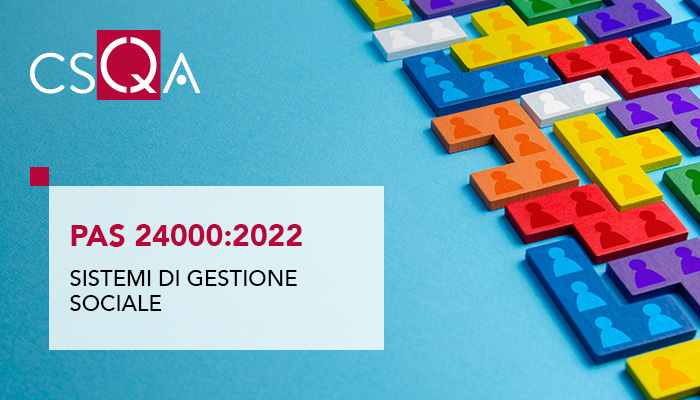
Guaranteeing a minimum level of social performance that includes issues such as labor relations, human rights, health, safety and corporate ethics: this is the objective of a social management system compliant with the PAS 24000:2022 "Social management system - Specification" standard.
The standard, published last September by the British Standards Institution (BSI), in fact defines the management requirements that allow the certified organization to meet the expectations of the interested parties in the medium and long term, with a view to continuous improvement also with respect to sustainable development.
THE SOCIAL MANAGEMENT SYSTEM
The certification of the social management system according to PAS 24000 can be issued by accredited bodies to any organization, regardless of the type or size , or of the products and services it produces or supplies.
The organization that certifies itself under accreditation therefore demonstrates that it has implemented a system that includes the policies, processes and procedures suitable for guaranteeing that all the actions aimed at achieving the pre-established social objectives are effectively implemented. Among these, ensuring fair treatment and a protected environment for its workers, in terms of safety and health, as well as compliant with legislative and regulatory requirements.
The scheme also provides that the organization refers to the worker's salary , both in terms of "minimum wage", established according to the collective agreement, and of "decent wage", i.e. the remuneration received for ordinary work, established by contract, sufficient to allow the worker to support a decent standard of living for him and his family.
THE APPROACHES OF THE PAS 24000
The PAS 24000 standard uses the process approach, the Plan-Do-Check-Act (PDCA) cycle and the principle of risk based thinking. The process approach allows you to define roles and responsibilities within organizations, while risk-based thinking minimizes negative effects and enhances the opportunities of planned actions.
The PDCA cycle applied to the social management system states that the company must:
-
determine and evaluate the risks, opportunities and social objectives (Plan)
-
implement processes as expected (Do)
-
monitor and measure processes in relation to social policy, including the organization's social commitments and objectives and report the results (Check)
-
take actions to correct deviations from expected results and continuously improve social performance to achieve expected results (Act)
(Source: ACCREDIA )